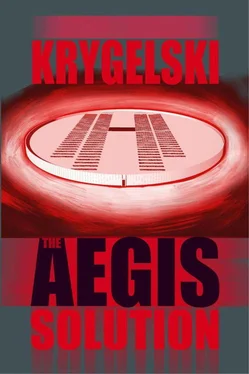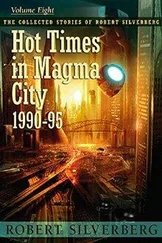When it was finished, new arrivals would be required to register within the receiving facility where they would each obtain an RFID card. As a part of the project, the outermost turnstile was to be modified so that it would only move if an authorized card was carried by the person entering the cage. The card would not allow the bearer access before thirty days, giving the new arrivals an opportunity to change their minds. To prevent the buying, selling, stealing, or swapping of cards among those in waiting, a biometric scan would be recorded at the time the new arrival received the card. The biometrics had to match the cardholder at the end of the thirty days or the card would be voided.
But, Elias knew, none of that was yet in place. At the end of the 2x4 and plywood tunnel was the turnstile, and that was it.
A gust of wind violently rocked the car, and Elias’ view of Aegis was briefly obscured by dust. He decided there was no point in delaying any further, and he grabbed his suitcase with his right hand while firmly gripping the door handle with his left. As Elias tripped the door release, the wind instantly pulled the handle from his grasp and slammed the door all the way open, wrenching the hinges in the process. The interior was instantaneously filled with tan-colored powder even though he quickly climbed out and fought the force of the wind to slam the door of the car. Due to the now sprung hinges, the car door did not fully close, making it impossible for him to lock it.
Hunched forward, Elias walked/trotted to the mouth of the safety tunnel and gratefully took a few steps in, glad for the modest respite from the gale. Although he was tempted to again pause, the severe shuddering and creaking from the wooden tunnel prompted him to proceed through the wobbly, makeshift structure before it collapsed on top of him. The turnstile, lighted from behind, loomed ominously at the end. As he neared it, his familiar goulash of emotions returned. Dread, fear, anger, and frustration were but a few of the feelings elicited by the sight of the steel entrance.
Though it was a chilly day, as his fingers touched the bars, he involuntarily jerked them back; the horizontal metal rods of the turnstile felt substantially, almost irrationally, colder than the ambient temperature. Indicating impatience with himself by a shake of his head, Elias firmly grasped the bars and pushed forward. The loud clack-clack-clack of the ratchet mechanism reinforced his already present feeling of foreboding.
All of his speculating, all of his contemplating, wondering, and even dreaming as to what he would find inside was about to be answered. In his mind, he pulled up the floor plan of the entry. After navigating the entrance turnstile, which was actually a series of three turnstiles, each positioned around a corner from the previous, the first area he would see would be a wide corridor, which, he recalled, was one of many spokes on a wheel. He remembered thinking, as he had studied the layout, that Aegis reminded him of a science fiction space station. It was designed with concentric rings, served by arcing passageways, each of those accessed by wider corridors radiating straight outward from the center common area.
This entire thought process transpired in the few paces it took him to pass through the final turnstile. He reached the interior opening where the horizontal bars of the turnstile passed through the fixed set of bars, which precluded the entrant from simply staying inside the revolving door and proceeding back out again. This prevented the turnstile from being used as an exit, since the bars would only travel in one direction.
Unbeckoned, the melody and lyrics of the Eagles song “Hotel California” filled his mind as he stepped from the turnstile and surveyed the room. The entire facility was designed to minimize electrical and water usage and, in fact, was completely off the grid. Daytime lighting was accomplished utilizing integrated solar collectors, reflective tubes, and diffuser lenses to capture the maximum amount of sunlight on the exterior and carry it inside to the corridors and rooms of the complex. Most of the roof surface was covered with solar panels, to convert sunlight into electricity. Water came from a primary well and a secondary, or backup, well. The pumps on both of these wells ran only during the day, when the solar panels were generating electricity, each of them maintaining the water level of two elevated tanks, which provided adequate water pressure due to simple gravity. Hot water was also created during the day, again by use of the sun and a crisscrossing web of insulated black pipes leading from the roof areas. These pipes were fed by the water tanks. The sun heated the water within them during the meandering journey through the latticework, until the water was diverted down into the building where the pipes were chambered in another insulated raceway and tied into the plumbing system for general use. Sewage was handled by an extensive septic system installed in the desert adjacent to the facility. All garbage was to be dumped in a massive, lined excavation with a powerful ram assembly at the top. The debris was first compacted and then dropped into the pit.
Other than the water from the aquifer and the limitless sunlight, Aegis took nothing from society and gave nothing back. Zero impact was the goal of its state-of-the-art design.
As Elias stepped into the entry corridor, the first image which greeted his eyes was also the first answer to his volume of questions. All of the visible walls were covered with graffiti. None of the so-called urban art had been visible on the video he had seen in Faulk’s office because the camera was tightly focused on the exit from the turnstile and did not show the adjacent walls. To his uninitiated eye, it was unreadable, communicating contempt rather than any specific message. In one sense, he was not surprised by the vandalism, since Aegis was anarchy in its purest form with no pre-existing governance or law enforcement. One of the many problems Elias had with the establishment from its inception was the concept of creating an environment where people, who were already at the end of their ropes, would wander in and then be expected to create a viable society from scratch.
The entry corridor, lined with several doors, was easily spacious enough to accommodate hundreds of people, yet it was empty. Despite the lack of an audience, Elias resisted the urge to wave at the camera, knowing that Faulk was watching and had been impatiently waiting for his arrival. He did make a point of ensuring that the lens received a full-frontal view of his countenance.
“I wasn’t expecting a welcoming committee anyway,” Elias said aloud, his voice echoing back to him from the various hard surfaces.
On the train ride, he had found the tally in the files: more than eleven thousand people had entered Aegis since it opened. There was, of course, no way for him to know the current population.
Elias shifted his suitcase to his left hand and reached into the pocket of his windbreaker with his right, gripping the butt of the 9mm Beretta but leaving it concealed. With his feeling of self-confidence bolstered, he walked forward into the corridor.
Knowing from his memorization of the plans that he had a nearly one-half-mile walk to the center of the complex, he paced himself at a steady but not quite brisk stride. He did veer to the side so that he walked near the right-hand wall, rather than down the center. The silence and emptiness was unsettling, creating the illusion that Aegis was completely unoccupied and abandoned.
Elias had traveled approximately one hundred yards, he guessed from counting his paces, when he approached the first of the intersecting hallways. This would be the outermost ring of residential units. The graffiti was as dense on the walls as it had been at the entrance. Just as he entered the intersection, two young men stepped into his path from the right side, coming to a halt directly in front of him. Before he could react, he noticed two more emerge from the hallway to his left, supplementing the impromptu blockade. Elias stopped and said nothing, wanting them to make the first move.
Читать дальше












